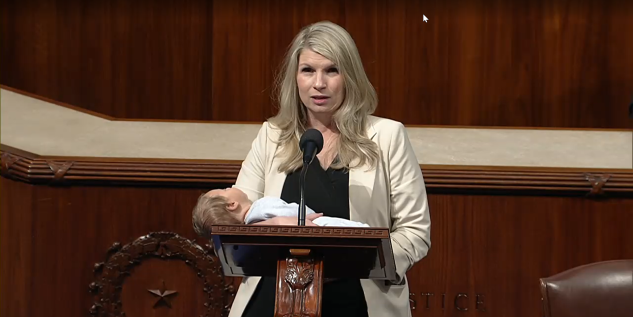- Lawmakers with health complications, newborn baby rush to vote
- Proxy voting carveout would make Johnson’s floor math harder
Democratic Rep. Brittany Pettersen’s eleventh-hour appearance on the House floor with a one-month-old baby in tow, an attempt to foil the GOP’s budget plan, renewed attention on a monthslong push for a rule change that could have saved her the trip.
“Unfortunately, I wasn’t given the opportunity to vote remotely after giving birth,” Pettersen (D-Colo.) said Tuesday night, holding newborn Sam for a floor speech about why she opposes cuts to programs such as Medicaid. “I agree, Sam,” she said when he started crying.
The House allowed members to vote by proxy during the Covid-19 pandemic under then-Speaker Nancy Pelosi (D-Calif.), which Democrats and Republicans used over the two-plus years it was in place. When Speaker Kevin McCarthy (R-Calif.) took the gavel in 2023, he ended remote voting altogether, saying members “have to show up to work if they want their vote to count.”
Members of both parties have urged House leaders to allow a narrow carveout to allow proxy voting for new parents. Pettersen is only the 13th member to give birth in office, but others such as Rep. Wesley Hunt (R-Texas) have missed votes to care for their newborns.
Pettersen’s mad dash from Colorado gives proxy voting proponents a concrete example of how members could benefit the bipartisan “Proxy Voting for New Parents Resolution” (
But it also boosts GOP leaders’ incentive to block it: Pettersen’s vote made it harder for Speaker Mike Johnson (R-La.) to secure a majority for Tuesday’s budget resolution. He ultimately succeeded after holding an unrelated vote open for more than an hour then, scuttling and quickly rescheduling the one on the GOP plan.
Even before becoming speaker, Johnson said proxy voting was unconstitutional. Then a rank-and-file member and former constitutional lawyer, he joined a lawsuit in 2020 against Pelosi’s Covid-19 remote voting allowance. Johnson has continued to resist any carveout for proxy voting since becoming speaker. “It doesn’t fit with the language of the Constitution and that’s the inescapable truth,” he told CNN last month.
Small Margin
Johnson’s narrow 218-215 majority means that with full attendance, he can only lose one Republican vote and still pass a party-line bill. He wouldn’t be able to lose a single vote after Rep. Elise Stefanik (R-N.Y.) leaves the House for her United Nations post and before two Florida special elections in April.
His math changes with Democrats’ routine absences. Rep. Raúl Grijalva (D-Ariz.), who has cancer, hasn’t voted since early January. Rep. Frederica Wilson (D-Fla.), 82, has missed more than half the votes this year, according to CSPAN data. Pettersen is on maternity leave, and Rep. Kevin Mullin (D-Calif.) was recently hospitalized for knee surgery and a resulting infection.
Democrats used that to their advantage, hiding Pettersen and Mullin in the cloakroom and leadership offices to throw off Johnson’s vote math. Wilson also appeared for the budget vote after missing an earlier procedural vote that Republicans often use as a bed check.
“I got out of the hospital yesterday, was at Kaiser all day,” Mullin said Tuesday night as he unexpectedly emerged from leadership offices for the budget vote, using a walker. Whip Katherine Clark (D-Mass.) later told reporters he flew from California with an IV to make the vote.
House Majority Leader Steve Scalise (R-La.) said Republicans don’t consider Democratic attendance when counting their votes. He said Democrats sometimes hide their members to obscure vote totals, and that Republicans bank solely on their own members.
But the math undoubtedly matters. Rep. Dan Crenshaw (R-Texas) came back for Tuesday night’s vote after being sick with the flu, according to a source familiar. If Crenshaw hadn’t shown up and Grijalva had, Johnson would have lost the budget vote with one defector, Rep. Thomas Massie (R-Ky.).
The narrow 217-215 vote boosted House Republicans’ plan for a single bill covering major portions of President Donald Trump’s agenda. But they still have to reach agreement with the Senate, which embraced a narrower approach Feb. 21.
The months ahead will force Johnson to harangue his party’s right flank and moderates to pass the actual reconciliation bill.
“We’re going to celebrate tonight, and we’re going to roll up our sleeves and get right back at it in the morning,” Johnson said Tuesday night, acknowledging the tough work ahead.
Discharge Process Eyed
That work will get tougher if Rep. Anna Paulina Luna (R-Fla.), Pettersen, and more than 100 bipartisan cosponsors successfully discharge their proxy voting resolution they introduced in January for a House vote.
Discharge petitions typically fall short, given the reluctance of majority members to buck their leaders by publicly signing on. Republicans helped push two over the line in the last Congress, forcing action on bills that had bipartisan backing.
Luna filed a new resolution (
Pettersen estimates lawmakers could vote to pass it by mid-to-late March, giving her a brief window of maternity leave where she could still participate in House proceedings.
To contact the reporter on this story:
To contact the editors responsible for this story:
Learn more about Bloomberg Law or Log In to keep reading:
See Breaking News in Context
Bloomberg Law provides trusted coverage of current events enhanced with legal analysis.
Already a subscriber?
Log in to keep reading or access research tools and resources.


